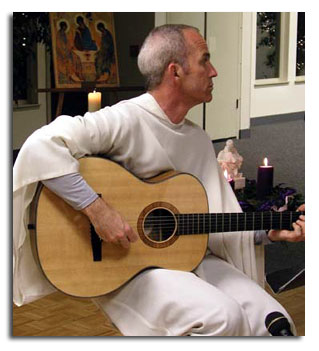Fr. Cyprian Consiglio
helps others hear call to contemplation - By
Cathy Redfern

The
message of Father Cyprian Consiglio is finding listeners in the
diocese.
Consiglio's superiors at the New Camaldoli Hermitage in Big
Sur have recently given him three more years to continue his
work leading retreats and workshops and performing concerts on
a theme he calls "Spirit, Soul and Body: The Universal Call
to Contemplation."
The 48-year-old monk and music composer says his calling is
in finding the similarities among different religious paths,
and in helping people realize there is room in Catholocism for
some of the practices which appeal to them from other traditions
(he gives examples of yoga and Buddhist meditation practices).
Also, he said, it is a joy to be able to find a common language
to talk with people of other faiths, and to help Christians discover
the beauty in other traditions.
His message has found an audience in the diocese and elsewhere
for the past four years, and Consiglio is a popular workshop
and retreat leader and musician. He divides most of his time
these days, when not traveling, between Holy Cross Church and
a cabin in the Santa Cruz Mountains.
Consiglio says we are all called to a contemplative experience
of God, and that calling is found in all religions. He speaks,
eloquently, and often with a musician's vocabulary, of the value
in finding "resonances" amongst religions. In essence, he said,
there are commonalities at the most basic, and at the deepest
level, of many spiritual paths.
"So many people have left Christianity and found something they
seek in another tradition, and they can't find their way back," he
said. "They are who I feel called to serve. They want to come
home. They tell me they never thought could do this in Catholicism."
At a recent retreat at St. Clare's in the Santa Cruz Mountains,
days began with yoga at 6:30 a.m., followed by meditation and
prayer that included songs and prayers from Catholicism and other
traditions.
Consiglio's current work began in 1992, when he met an English-born
monk from India, Bede Griffiths. Griffiths, who died in 1993,
spent many years at an ashram, immersing himself in Hinduism
and Indian culture and becoming a significant contributor to
the development of Indian Christian theology. The ashram, Shantivanam,
in Tamil Nadu, became a center of contemplative life, inculturation
and inter-religious dialogue.
Consiglio is now a member of the trust that oversees Griffiths'
legacy, and this summer he traveled to England to help celebrate
the centennial of his birth. He visits Shantivanam too, to help
with the work there, and will go again in December. In Santa
Cruz, at Holy Cross, he has started a "sangha," in honor of Griffiths.
(Sangha is a word in Indian languages typically used to refer
to Buddhist assemblies of those pursuing spiritual enlightenment).
Consiglio calls it all "bridge work," and says it goes both
ways. Christians can benefit from the truth and beauty in other
religions, he said, and from seeing Christianity through the
eyes of others, or through new eyes. The analogy he uses is looking
at your home from someone else's window.
"It strikes me as right," he said, in a recent interview
at a downtown Santa Cruz cafe. "There's truth to it, and in finding
resonances in different traditions, especially in this day and
age. People have found the same texts to disagree, to argue for
war, or against war, so we had better find some words we can
agree on pretty quick!"
Consiglio has become interested in Islam, he says, which he
calls "a very proud and revered tradition." He finds it more
challenging to understand than Hinduism, Buddhism, Taoism, which
he has spent 15 years studying.
He recalled meeting a Muslim man in Washington D.C. and together
they were able to speak of the "99 Beautiful Names of God," an
Islamic practice in which references to God in the Koran are
recited with the use of prayer beads.
"It just felt so good to connect," he said. "...The Buddha
says something about 'convenient means.' In a sense, there is
often a specific way in which people understand truth. Sometimes,
when you can find another vocabulary, it can be such a delight
to others that you understand them."
His Tuscany-based order believes in inter-religious dialogue,
he said, yet he cautions that he is "a mere dilettante," in his
study of other faiths and admits that differences in religious
dogma and customs can be vast.
"But if you go deep, there is quite a lot of resonance," he
said. "And at the deepest level..." he trails off, holding out
his a vibrating hand like a divining rod.
Consiglio grew up in the Phoenix area and supported
himself as a musician throughout his 20s, singing and playing
guitar in rock and reggae bands, at weddings, in choirs. When
he decided to consider becoming a monk, he barely touched the
guitar for some 10 years before picking it up again when a visitor
to the monastery suggested he put sacred poems and other text
to music (his latest CD available on iTunes, his 12th "Compassionate
and Wise," is
based on poems from various sacred traditions).
These days, most of what he does includes music. And no matter
where he is, he sets aside time each morning for what he calls "inner
work." This includes exercise, prayer and meditation, though
he admits with a smile that "activity always seems better at
first glance, especially if it's holy work."
But he is trying to to practice what he preaches, and to live
the "sprit, soul and body" aspect of his beliefs. To Consiglio,
the soul includes emotions and higher forms of thought and feeling,
where the spirit is "beyond all: the source and the summit."
He believes the contemplative or mystical experience of God
is not something to be grasped at, but something you wait and
make yourself available for, and then receive as a gift.
|